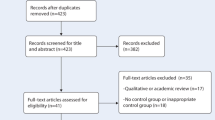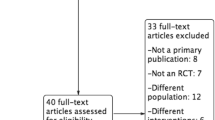Abstract
Background
Recent trial data suggest a benefit to catheter ablation (CA) compared to medical therapy for atrial fibrillation (AF) in patients with heart failure (HF). Nevertheless, because of mixed trial evidence, contemporary guidelines give it a class 2 recommendation. Accordingly, we sought to assess the currently available evidence for CA in HF with AF.
Methods
Electronic databases were searched to identify randomized clinical trials (RCTs) comparing CA to medical therapy in patients with AF and HF. Study data was pooled using fixed and random effects, and the number needed to treat (NNT) was calculated to gauge absolute risk differences. Heterogeneity was quantified using I2. Our primary outcome was all-cause mortality.
Results
Nine trials (CA 1075 patients; medical therapy 1083 patients) were included. Ablation reduced the relative risk of all-cause mortality by 31.5% (95% CI 13.7 to 45.6%; NNT = 23), cardiovascular mortality by 39.3% (95% CI 10.9 to 58.7%; NNT = 31), cardiovascular hospitalization by 29.1% (95% CI 9.4 to 44.6%; NNT = 9), and heart failure hospitalization by 28.5% (95% CI 6.5 to 45.4%; NNT = 22). Improvements in quality of life were observed with CA using the Minnesota Living with Heart Failure Questionnaire (mean difference – 5.26; 95% CI − 2.73 to − 7.78) and the Atrial Fibrillation Effect on Quality of Life (mean difference 5.36; 95% CI 2.72 to 8.00).
Conclusion
Compared to medical therapy, CA for AF in patients with HF reduces all-cause mortality, cardiovascular mortality, cardiovascular hospitalizations, and heart failure hospitalizations, and may improve quality of life.
Graphical Abstract





Similar content being viewed by others
Data availability
All of the data and code for statistical analysis used for this manuscript will be made available upon request by emailing the first author.
Abbreviations
- HF:
-
Heart failure
- AF:
-
Atrial fibrillation
- CA:
-
Catheter ablation
- RCT:
-
Randomized clinical trial
- HFrEF:
-
Heart failure with reduced ejection fraction
- HFpEF:
-
Heart failure with preserved ejection fraction
- NNT:
-
Number needed to treat
- RR:
-
Risk ratio
References
Roth GA, et al. Global burden of cardiovascular diseases and risk factors, 1990–2019: update from the GBD 2019 study. J Am Coll Cardiol. 2020;76(25):2982–3021. https://doi.org/10.1016/j.jacc.2020.11.010.
Chiang CE, et al. Distribution and risk profile of paroxysmal, persistent, and permanent atrial fibrillation in routine clinical practice: insight from the real-life global survey evaluating patients with atrial fibrillation international registry. Circ Arrhythm Electrophysiol. 2012;5(4):632–9. https://doi.org/10.1161/CIRCEP.112.970749.
Avitall B, Bi J, Mykytsey A, Chicos A. Atrial and ventricular fibrosis induced by atrial fibrillation: evidence to support early rhythm control. Heart Rhythm. 2008;5(6):839–45. https://doi.org/10.1016/j.hrthm.2008.02.042.
Li D, Fareh S, Leung TK, Nattel S. Promotion of atrial fibrillation by heart failure in dogs: atrial remodeling of a different sort, (in eng). Circulation. 1999;100(1):87–95. https://doi.org/10.1161/01.cir.100.1.87.
Mamas MA, Caldwell JC, Chacko S, Garratt CJ, Fath-Ordoubadi F, Neyses L. A meta-analysis of the prognostic significance of atrial fibrillation in chronic heart failure. Eur J Heart Fail. 2009;11(7):676–83. https://doi.org/10.1093/eurjhf/hfp085.
Kirchhof P, et al. Early rhythm-control therapy in patients with atrial fibrillation. N Engl J Med. 2020;383(14):1305–16. https://doi.org/10.1056/NEJMoa2019422.
Ruzieh M, et al. Meta-analysis comparing the relative risk of adverse events for amiodarone versus placebo. Am J Cardiol. 2019;124(12):1889–93. https://doi.org/10.1016/j.amjcard.2019.09.008.
Torp-Pedersen C, et al. Dofetilide in patients with congestive heart failure and left ventricular dysfunction. New England J Med. 1999;341(12):857–65. https://doi.org/10.1056/NEJM199909163411201.
Lehmann MH, Hardy S, Archibald D, Quart B, MacNeil DJ. Sex difference in risk of Torsade de Pointes With d, l-Sotalol. Circulation. 1996;94(10):2535–41. https://doi.org/10.1161/01.CIR.94.10.2535.
Køber L, et al. Increased mortality after dronedarone therapy for severe heart failure. New England J Med. 2008;358(25):2678–87. https://doi.org/10.1056/NEJMoa0800456.
Marrouche NF, et al. Catheter ablation for atrial fibrillation with heart failure. N Engl J Med. 2018;378(5):417–27. https://doi.org/10.1056/NEJMoa1707855.
Packer DL, et al. Ablation versus drug therapy for atrial fibrillation in heart failure: results from the CABANA trial. Circulation. 2021;143(14):1377–90. https://doi.org/10.1161/CIRCULATIONAHA.120.050991.
Heidenreich PA, et al. 2022 AHA/ACC/HFSA Guideline for the Management of Heart Failure: A Report of the American College of Cardiology/American Heart Association Joint Committee on Clinical Practice Guidelines. Circulation. 2022;145(18):e895–1032. https://doi.org/10.1161/CIR.0000000000001063.
McDonagh TA, et al. 2021 ESC Guidelines for the diagnosis and treatment of acute and chronic heart failure. Eur Heart J. 2021;42(36):3599–726. https://doi.org/10.1093/eurheartj/ehab368.
January CT, et al. 2019 AHA/ACC/HRS Focused Update of the 2014 AHA/ACC/HRS Guideline for the Management of Patients With Atrial Fibrillation: A Report of the American College of Cardiology/American Heart Association Task Force on Clinical Practice Guidelines and the Heart Rhythm Society in Collaboration With the Society of Thoracic Surgeons. Circulation. 2019;140(2):e125–51. https://doi.org/10.1161/CIR.0000000000000665.
Jones DG, et al. A randomized trial to assess catheter ablation versus rate control in the management of persistent atrial fibrillation in heart failure. J Am Coll Cardiol. 2013;61(18):1894–903. https://doi.org/10.1016/j.jacc.2013.01.069.
Kuck KH, et al. Catheter ablation versus best medical therapy in patients with persistent atrial fibrillation and congestive heart failure: the randomized AMICA trial. Circ Arrhythm Electrophysiol. 2019;12(12):e007731. https://doi.org/10.1161/CIRCEP.119.007731.
MacDonald MR, et al. Radiofrequency ablation for persistent atrial fibrillation in patients with advanced heart failure and severe left ventricular systolic dysfunction: a randomised controlled trial. Heart. 2011;97(9):678–8. https://doi.org/10.1136/hrt.2010.207340.
Di Biase L, et al. Ablation versus amiodarone for treatment of persistent atrial fibrillation in patients with congestive heart failure and an implanted device: results from the AATAC multicenter randomized trial. Circulation. 2016;133(17):1637–44. https://doi.org/10.1161/CIRCULATIONAHA.115.019406.
Hunter RJ, et al. A randomized controlled trial of catheter ablation versus medical treatment of atrial fibrillation in heart failure (the CAMTAF trial). Circ Arrhythm Electrophysiol. 2014;7(1):31–8. https://doi.org/10.1161/CIRCEP.113.000806.
Parkash R, et al. Randomized ablation-based rhythm-control versus rate-control trial in patients with heart failure and atrial fibrillation: results from the RAFT-AF trial. Circulation. 2022;145(23):1693–704. https://doi.org/10.1161/CIRCULATIONAHA.121.057095.
Prabhu S, et al. Catheter ablation versus medical rate control in atrial fibrillation and systolic dysfunction: the CAMERA-MRI study. J Am Coll Cardiol. 2017;70(16):1949–61. https://doi.org/10.1016/j.jacc.2017.08.041.
Sugumar H, et al. Catheter ablation versus medication in atrial fibrillation and systolic dysfunction: late outcomes of CAMERA-MRI study. JACC Clin Electrophysiol. 2020;6(13):1721–31. https://doi.org/10.1016/j.jacep.2020.08.019.
Wong C, et al. Abstract 15101: long-term outcomes following catheter ablation in patients with atrial fibrillation and heart failure: 7-year follow-up of the ARC-HF trial. Circulation. 2018;138(Suppl_1):A15101–A15101. https://doi.org/10.1161/circ.138.suppl_1.15101.
S-po05–108 catheter ablation of atrial fibrillation on heart failure symptoms and quality of life, Heart Rhythm 16(5):S426-S521 2019, https://doi.org/10.1016/j.hrthm.2019.04.018.
He X, et al. Atrial fibrillation induces myocardial fibrosis through angiotensin II type 1 receptor-specific Arkadia-mediated downregulation of Smad7. Circ Res. 2011;108(2):164–75. https://doi.org/10.1161/CIRCRESAHA.110.234369.
Roy D, et al. Rhythm control versus rate control for atrial fibrillation and heart failure. New England J Med. 2008;358(25):2667–77. https://doi.org/10.1056/NEJMoa0708789.
Hagens VE, et al. Rate control versus rhythm control for patients with persistent atrial fibrillation with mild to moderate heart failure: results from the RAte Control versus Electrical cardioversion (RACE) study. Am Heart J. 2005;149(6):1106–11. https://doi.org/10.1016/j.ahj.2004.11.030.
McMurray JJV, et al. Dapagliflozin in patients with heart failure and reduced ejection fraction. N Engl J Med. 2019;381(21):1995–2008. https://doi.org/10.1056/NEJMoa1911303.
McMurray JJ, et al. Angiotensin-neprilysin inhibition versus enalapril in heart failure. N Engl J Med. 2014;371(11):993–1004. https://doi.org/10.1056/NEJMoa1409077.
Packer M, et al. Effect of carvedilol on survival in severe chronic heart failure, (in eng). N Engl J Med. 2001;344(22):1651–8. https://doi.org/10.1056/nejm200105313442201.
Effect of metoprolol CR/XL in chronic heart failure. Metoprolol CR/XL Randomised Intervention Trial in Congestive Heart Failure (MERIT-HF), (in eng). Lancet. 1999;353(9169):2001–7.
Betts TR, et al. Absolute risk reduction in total mortality with implantable cardioverter defibrillators: analysis of primary and secondary prevention trial data to aid risk/benefit analysis. Europace. 2013;15(6):813–9. https://doi.org/10.1093/europace/eus427.
Turagam MK, et al. Catheter ablation of atrial fibrillation in patients with heart failure: a meta-analysis of randomized controlled trials. Ann Intern Med. 2019;170(1):41–50. https://doi.org/10.7326/M18-0992.
Bahnson TD, et al. Association Between age and outcomes of catheter ablation versus medical therapy for atrial fibrillation: results from the CABANA trial. Circulation. 2022;145(11):796–804. https://doi.org/10.1161/CIRCULATIONAHA.121.055297.
Author information
Authors and Affiliations
Corresponding author
Ethics declarations
Ethical approval
This study was exempted from the institutional review board’s approval because it used anonymized data that is publicly available.
Informed consent
Because this study used publicly available data, there was no patient involvement, and thus, no consent process was required.
Conflict of interest
The authors declare no competing interests.
Additional information
Publisher's note
Springer Nature remains neutral with regard to jurisdictional claims in published maps and institutional affiliations.
Supplementary Information
Below is the link to the electronic supplementary material.
Rights and permissions
Springer Nature or its licensor (e.g. a society or other partner) holds exclusive rights to this article under a publishing agreement with the author(s) or other rightsholder(s); author self-archiving of the accepted manuscript version of this article is solely governed by the terms of such publishing agreement and applicable law.
About this article
Cite this article
Sayed, A., Awad, A.K., Abdelfattah, O.M. et al. The impact of catheter ablation in patient’s heart failure and atrial fibrillation: a meta-analysis of randomized clinical trials. J Interv Card Electrophysiol 66, 1487–1497 (2023). https://doi.org/10.1007/s10840-022-01451-2
Received:
Accepted:
Published:
Issue Date:
DOI: https://doi.org/10.1007/s10840-022-01451-2




